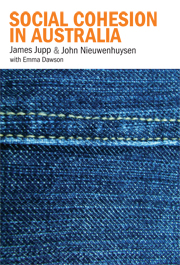Book contents
- Frontmatter
- Contents
- Foreword
- List of contributors
- List of tables
- Acknowledgments
- Introduction
- PART I DEFINING, MEASURING AND SEEKING SOCIAL COHESION
- PART II THE DYNAMICS OF SOCIAL COHESION
- 5 The landmark of Cronulla
- 6 Policing the other: Lebanese young people in a climate of conflict
- 7 Religious resurgence and diversity and social cohesion in Australia
- 8 Family and nation: the Indigenous/non-Indigenous relationship
- 9 Social cohesion and cultural fragility: a paradox of Indigenous rapports with Eurasian Australia
- 10 Educational attainments, inter-ethnic marriage and social cohesion
- PART III INFLUENCES AND RESPONSES IN SEARCHING FOR SOCIAL COHESION
- References
- Index
9 - Social cohesion and cultural fragility: a paradox of Indigenous rapports with Eurasian Australia
Published online by Cambridge University Press: 22 September 2009
- Frontmatter
- Contents
- Foreword
- List of contributors
- List of tables
- Acknowledgments
- Introduction
- PART I DEFINING, MEASURING AND SEEKING SOCIAL COHESION
- PART II THE DYNAMICS OF SOCIAL COHESION
- 5 The landmark of Cronulla
- 6 Policing the other: Lebanese young people in a climate of conflict
- 7 Religious resurgence and diversity and social cohesion in Australia
- 8 Family and nation: the Indigenous/non-Indigenous relationship
- 9 Social cohesion and cultural fragility: a paradox of Indigenous rapports with Eurasian Australia
- 10 Educational attainments, inter-ethnic marriage and social cohesion
- PART III INFLUENCES AND RESPONSES IN SEARCHING FOR SOCIAL COHESION
- References
- Index
Summary
Globalisation and social cohesion have been related, and for obvious reasons. The patriotic jealousy that stimulates chauvinism and cultural division is apparently overcome by globalisation. With globalisation comes the sharing of social aspirations; they are driven by international energies, in which people's fortunes are no longer determined by parochial privileges – vigilantly guarded by protectionism – but transnational corporate structures and ambitions which bring together people of diverse background.
This positive view of globalisation is held in good faith. The breakdown in equality and social cohesion which might occur in wealthy nations through the erosion of welfare is regarded as having a negative effect on globalisation, stimulating alienated and possibly reactionary elements to resist the benefits of a potentially unified world. This has been argued with many layers of sympathy by scholars in other countries, such as Italy.
Like all products of the Enlightenment, from the universality of science to the encyclopaedia, globalisation might be considered an unfinished project. The ideal of a uniform set of values spread across the planet would be convenient for stability and peace. The commonwealth of aspiration would be tangibly reinforced by shared legislation, labour, corporate structures and markets. Alas, even with these aspirations, communities are never so cohesive that cultural differences, with their fierce histories of antagonism and attempted effacement, can be entirely obliterated. And understandably, the persistence of localised values, memories and local interest shades off into bitterness when local interests are under threat or face demolition.
- Type
- Chapter
- Information
- Social Cohesion in Australia , pp. 103 - 113Publisher: Cambridge University PressPrint publication year: 2007
- 2
- Cited by



